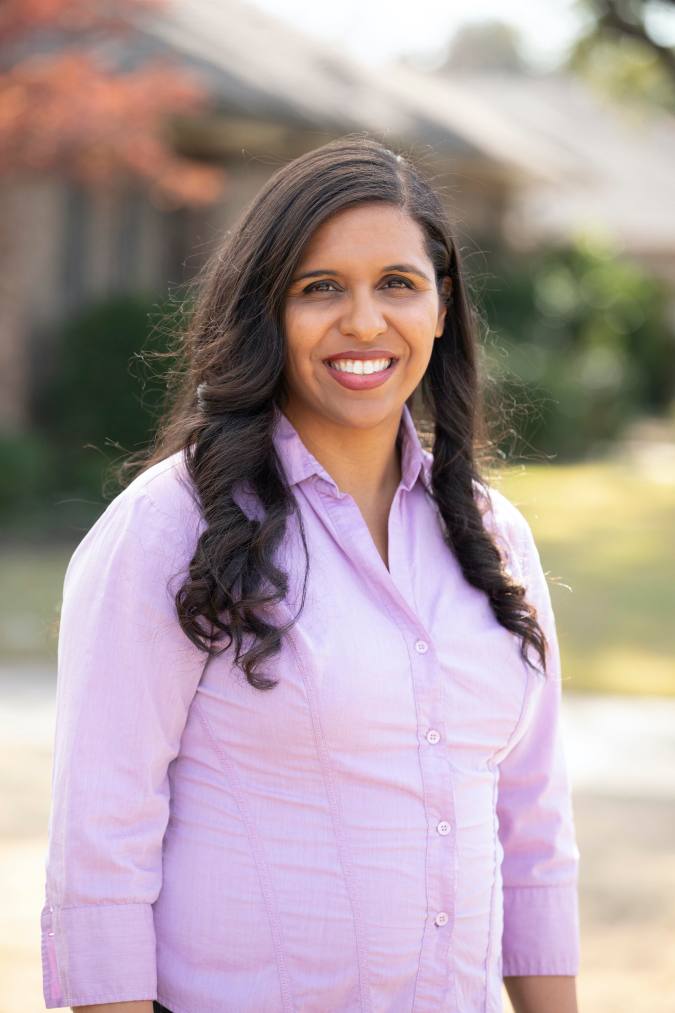On July 14, 36-year-old Candace Valenzuela was sitting at home, watching in slight disbelief as she inched closer and closer to making U.S. history. Valenzuela had been locked in a tight Democratic primary race for Texas’ open 24th Congressional District and, as results poured in, it was clear she was pulling ahead of her opponent, Kim Olson.
“At that point, people were calling me and screaming going, ‘You won, you won!’” Valenzuela remembers. But she wanted to wait until the results were official. “I was just like, ‘I need to hear the [Associated Press], guys. It’s not real until the AP says it’s real!’”
The AP published a breaking tweet announcing her victory ten minutes before midnight. Valenzuela, an educator and mother of two who got her start in politics as an at-large member of the Carrollton-Farmers Branch Independent School District, secured 60% of votes. Olson got 39%. The celebrations and excitement happened virtually due to the pandemic.
“My election night watch party was a series of Zoom rooms that I would pop into to see people. It wasn’t the same as being at tables and having all of their faces there, but it was great to see the little squares and the faces of my loved ones and neighbors and supporters from all over,” she tells Remezcla. “There’s a lot of devastating things about right now but I think one of the saddest things is that you can’t grieve or triumph as a physical community, even though I am so thrilled that I was able to see everyone over Zoom. I guess ‘poignant’ is probably an appropriate word for what the feeling was.”
We’re really, really excited about taking that momentum in order to win in November.
Valenzuela and her campaign had a lot to be proud of: Her win in the primary runoff means she could be the first-ever Black Latina in Congress, potentially flipping a seat that’s been red since Kenny Marchant took it over 15 years ago. Now, her next challenge is facing off against the Trump-backed Republican Beth Van Duyne in the November elections, but Valenzuela says the primary results have energized her team: “We’re really, really excited about taking that momentum in order to win in November,” she says.
Valenzuela grew up in El Paso to parents who were military veterans and, in many ways, her personal experiences have shaped her campaign. As a kid, she struggled through a period of homelessness—something she laid out in a 2019 ad that went viral and shot her to prominence after she announced she was running to unseat Merchant. (He later announced he wouldn’t seek reelection). In the ad, Valenzuela recounts sleeping in a kiddie pool at a gas station after her mother fled an abusive situation and spending time at a shelter while her family got back on their feet. Valenzuela says that the support of her school and her teachers helped her through the difficulties and she eventually got a full ride to Claremont-McKenna, where she studied government. Sharing such an intimate story wasn’t “the most comfortable thing to do,” but she tells Remezcla she was willing to open up when she thought about others experiencing similar hardships.
“I feel like, for myself, for my family, for people who grew up like me—and there are a lot more people like that right now, unfortunately, who are housing insecure, who are food insecure—it’s vital to saving them, to be able to reach out to folks and to let them know that there’s somebody who cares about what’s happening to them,” she says.
Valenzuela has prioritized working families and early childcare and education in her campaign, which also includes progressive policies, such as raising the minimum wage to $15, defending a woman’s right to choose and addressing racial injustice. In recent weeks, she’s said she would ensure small businesses are supported during the coronavirus pandemic, as well.
Campaign finance reform is also a priority—Valenzuela says she hasn’t accepted corporate political action committee (PAC) money and, in terms of cash on hand, recent figures show Van Duyne’s campaign outpaces Valenzuela’s by a few hundred thousand dollars. Valenzuela has received endorsements from Barack Obama, Julian Castro, the recently announced Democratic Vice President nominee Kamala Harris and the late John Lewis who once said that she brings a “unique perspective” to “issues of racial and economic justice are front and center in America right now.”

Valenzuela, who grew up with a Mexican-American mother and a Black father, says her experience is unique because “it’s a mixture of so many things, but it’s the quintessential American experience. It’s the experience of a family trying to put food on the table, keep a roof over their heads, get an education for their kids, and their community.” She adds that her understanding of so many cultures and experiences has helped her engage critically with communities. “You have an opportunity to be inside of a culture but also on the outside looking in. That’s painful but also it can be somewhat of a gift,” she says. “You get to think critically about your surroundings. You get to think about how people are genuine and how people have some blind spots.”
You get to think critically about your surroundings.
When it comes to potentially making history as the country’s first Black Latina in Congress, Valenzuela says the moment comes with responsibility, but she’s also amazed how long it’s taken: “It’s kind of crazy that in 2020, we’re still talking ‘first.’ I’m still astonished that in Texas, we had our first Latinas [in] just 2018—Sylvia Garcia and Veronica Escobar.” She encourages other Black Latinas and women of color who want to go into public service to find supportive communities that will lift them up and truly advocate for their goals.

“There are going to be a lot of people that you’re going to think are fine with you because they’re okay with you. They’re okay with you as a waitress, they’re okay with you as their coworker even, but they’re not going to be okay with you as their manager. They’re not going to be okay with you as their member of congress. Those are not the voices that are there to help you,” she says. “You just need to make sure that you’re prepared for the job that you want to do, that you do the work to get there, and just rely on the community of your core supporters.”
It’s kind of crazy that in 2020, we’re still talking ‘first.’
The sentiment explains, in part, why Valenzuela has been working through her campaign to ensure young people of color have a place on her team, which has 40 interns and fellows. She says it’s important to her to broaden the pipeline and get them the skills they need to one day launch their own campaigns or become leaders in their own communities.
“They’re not just sharing stuff on social media for us. We’re teaching them how to organize communities,” she explains. “We’re teaching them how to handle campaign finance. We’re teaching them how to raise money so that when this campaign is over, for better or for worse, they’re doing good work that they can take back to their communities.”




